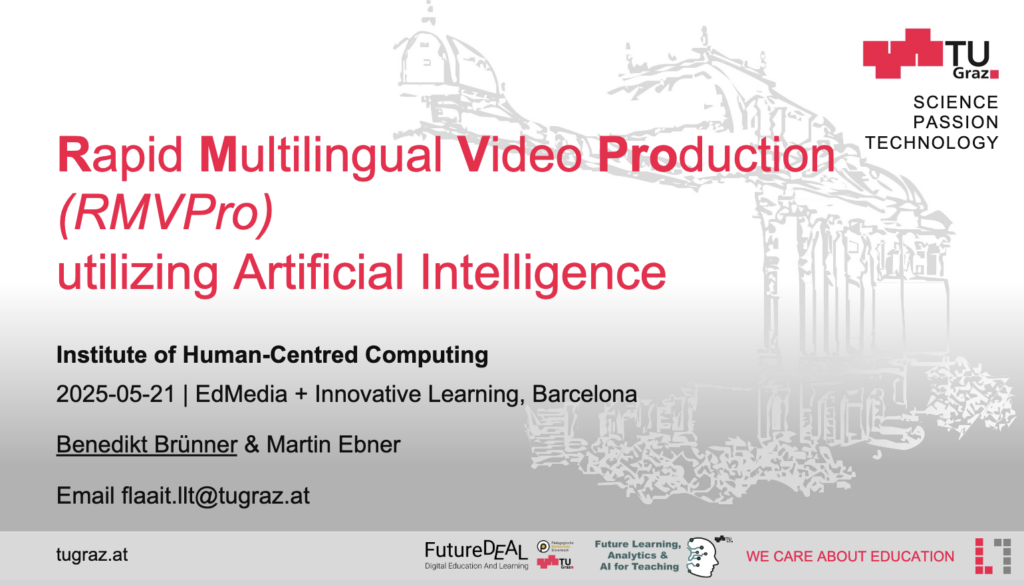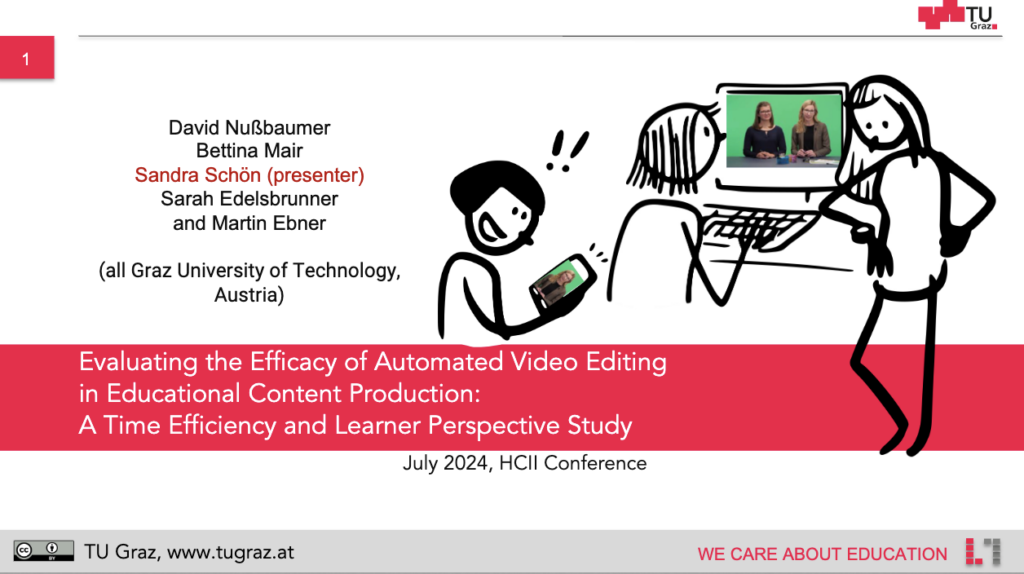Zu den Welcome Days der TU Graz gibt es nun auch ein Video – danke an mein Videoteam für die großartige Zusammenfassung:
[publication] Early Findings from Pilots in AI-Driven Education: Effects of AI-Generated Courses and Videos on Learning and Teaching #research #tugraz #AI
This is an impactful contributions, methodological rigor, and exceptional novelty in the research field of AI in education.
Our chapter in the new book on Emerging Technologies, „Early Findings from Pilots in AI-Driven Education: Effects of AI-Generated Courses and Videos on Learning and Teaching,“ has been published.
Abstract:
This paper presents the (preliminary) findings from three pilot activities conducted at TU Graz over the past 18 months, exploring the use of AI in generating (open) educational resources. The first pilot involved developing a MOOC titled “Societech: Society in the Context of Information Technologies”, which utilized various AI tools to create videos and learning materials, engaging over 500 participants. The second pilot focused on creating multilingual videos for the MOOC “Open Educational Resources in Higher Education”, using AI-generated avatars of course instructors, involving more than 800 participants. The third pilot was a field study conducted in an Austrian secondary school, where 20 students aged 12–15 could choose between videos featuring their teacher, an AI-generated human avatar, or a cartoon character. Preliminary results indicate a clear preference for teacher-led videos, highlighting the significant role of the teacher in the learning process. While AI tools facilitated quicker and more cost-effective production of educational resources, challenges such as the need for quality assurance and handling of (now possible) automatic translations were noted.
[draft @ ResearchGate]
[full version @ publisher’s website]
Reference: Schön, S., Brünner, B., Ebner, M., Edelsbrunner, S., Hohla-Sejkora, K., Uhl, B. (2025). Early Findings from Pilots in AI-Driven Education: Effects of AI-Generated Courses and Videos on Learning and Teaching. In: Auer, M.E., May, D. (eds) 2024 Yearbook Emerging Technologies in Learning. Learning and Analytics in Intelligent Systems, vol 44. Springer, Cham. https://doi.org/10.1007/978-3-031-80388-8_2
[video] Digitale Bildung #avatar #ki #tugraz
Wir haben wieder etwas mit „meinem“ Avatar herumgespielt und ein Video erstellt rund um das Thema „Digitale Bildung“. Das gibt es nun in zwei Versionen – deutsch und englisch. Vielleicht ist es ja auch in anderen Kontexten hilfreich, freu mich wie immer auf Rückmeldungen.
[presentation] Rapid Multilingual Video Production (RMVPro) utilizing Artificial Intelligence #tugraz #ai #video
Our next talk at this year’s ED-Media conference is about „Rapid Multilingual Video Production (RMVPro) utilizing Artificial Intelligence“. Find the slides right here:

Brünner, B. & Ebner, M., (2025). Rapid Multilingual Video Production (RMVPro) utilizing Artificial Intelligence. ED-Media 2025 conference, presentation, Barcelona [slides]
[master] Learning with AI based Videos #AI #tugraz
Congratulations to Patrick, who defended his masterthesis about „Learning with AI based Videos“ successfully. Here you can find his final slides:

[interview] Using AI-Generated Instructor Video for Multilingual Content in MOOCs #tugraz #edtech
Benedikt gave an interview about „Using AI-Generated Instructor Video for Multilingual Content in MOOCs“ to the „Association for the Advancement of Computing in Education“ and introduced our recent research on AI-genereated videos:
Benedikt Brünner is a member of the e-education team at TU Graz, and facilitates the production of avatars, assets, audio and video. As part of his PhD project he has conducted initial survey research to gauge students’ reactions to AI avatars. While most students found the avatars to be authentic and natural, they still preferred real human teachers over AI avatars. However, many students indicated that they would not have realized that the videos were AI-generated, which shows the increasing sophistication of the technology.
In the interview, Benedikt Brünner discusses the potential of generative AI for creating educational videos.
[publication] Workshop: Creating Educational Videos with an AI Avatar Video Generator #tugraz #research
We did a workshop at this year’s ED-Media conference in Brussels about „Creating Educational Videos with an AI Avatar Video Generator„
Abstract:
The integration of Artificial Intelligence (AI) into the creation of learning materials represents a cutting-edge frontier. This workshop is designed for educators, content creators, and instructional designers, and will introduce participants to the potential of AI avatar software in the production of educational videos. Through interactive demonstrations and guided practice, participants gain practical skills in utilizing AI avatar software to create educational videos that meet different learning styles and needs. We will explore case studies of successful implementations and discuss strategies for integrating AI avatars into various educational contexts, from K-12 to higher education and corporate training. Additionally, the workshop will address ethical considerations and best practices in the use of AI in education, ensuring that participants are equipped to responsibly navigate the challenges of digital content creation. Participants will leave the workshop with an initial understanding of the capabilities of AI avatar software and their first experience in creating educational videos with this new technology.
[article @ publisher’s homepage]
[article @ ResearchGate]
Reference: Brünner, B. & Ebner, M. (2024). Creating Educational Videos with an AI Avatar Video Generator. In T. Bastiaens (Ed.), Proceedings of EdMedia + Innovate Learning (pp. 1165-1166). Brussels, Belgium: Association for the Advancement of Computing in Education (AACE). Retrieved July 22, 2024 from https://www.learntechlib.org/primary/p/224664/.
[publication] The use of programming tasks in interactive videos to increase learning effectiveness at MOOCs #tugraz #mooc
Our publication at this year’s ED-Media conference titled „The use of programming tasks in interactive videos to increase learning effectiveness at MOOCs“ is now available online.
Abstract:
The importance of digital technologies, especially videos, increased over the course of the last few years. Whether they are used to watching the latest news or for entertainment purposes, one could say they have become almost omnipresent in everyday’s life. This development has also influenced education. Therefore, we want to examine the effects of interactive overlays such as programming tasks in interactive learning videos. For this purpose, a MOOC course was created to gain information about participants` learning success. To evaluate whether the interactive elements have a positive effect, two test groups completed the course. The results revealed that the test group with overlays performed better on average than the group without. Some limitations had to be considered, such as the smaller peer group that watched the videos without interactive elements.
[article @ publisher’s homepage]
[article @ ResearchGate]
Reference: Geier, G., Weiß, M., Wachtler, J. & Ebner, M. (2024). The use of programming tasks in interactive videos to increase learning effectiveness at MOOCs. In T. Bastiaens (Ed.), Proceedings of EdMedia + Innovate Learning (pp. 38-47). Brussels, Belgium: Association for the Advancement of Computing in Education (AACE). Retrieved July 22, 2024 from https://www.learntechlib.org/primary/p/224503/.
[publication] Evaluating the Efficacy of Automated Video Editing in Educational Content Production: A Time Efficiency and Learner Perspective Study #tugraz #research
Out publication „Evaluating the Efficacy of Automated Video Editing in Educational Content Production: A Time Efficiency and Learner Perspective Study“ was published.
Abstract:
Automated editing technology offers notable efficiencies in educational video production. This study contrasts the time-saving benefits of automated editing against manual professional editing. Raw learning video footage was recorded in a professional studio with a green screen and presented in a frontal lecture style. The raw footage underwent editing by both an automated tool and professional editors. Time comparison results revealed significant savings with the use of automated tools. The paper further investigates the impact of automated editing on the learning video quality from the learners’ viewpoint. An online survey with 129 participants evaluated their perceptions of potential learning outcomes after viewing automatically and manually edited versions of two videos. The survey found a statistically significant difference in perceived learning potential from one of the videos, although not for both. Additionally, the study considers how differences in study group characteristics might influence these results. In summary, while automated editing presents a compelling case for production time reduction, its impact on the perceived quality of educational videos remains uncertain, necessitating additional research to understand the subtleties of learner interaction with video content.
[article @ publisher’s homepage]
[draft @ ResearchGate]
Reference: Nußbaumer, D., Mair, B., Schön, S., Edelsbrunner, S., Ebner, M. (2024). Evaluating the Efficacy of Automated Video Editing in Educational Content Production: A Time Efficiency and Learner Perspective Study. In: Zaphiris, P., Ioannou, A. (eds) Learning and Collaboration Technologies. HCII 2024. Lecture Notes in Computer Science, vol 14722. Springer, Cham. https://doi.org/10.1007/978-3-031-61672-3_15
[presentation] Evaluating the Efficacy of Automated Video Editing in Educational Content Production: A Time Efficiency and Learner Perspective Study #hcii #tugraz
We did a presentation at this year’s HCII conference about „Evaluating the Efficacy of Automated Video Editing in Educational Content Production: A Time Efficiency and Learner Perspective Study“. You can find here the slides:


